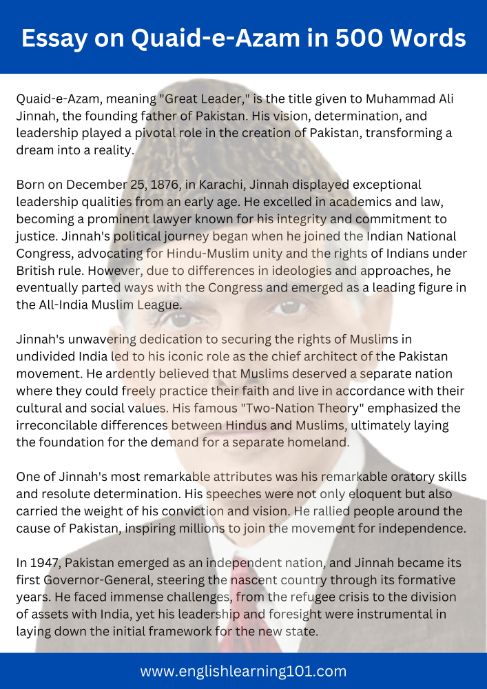Essay on Quaid-e-Azam Muhammad Ali Jinnah

Quaid-e-Azam, meaning “Great Leader,” is the title given to Muhammad Ali Jinnah, the founding father of Pakistan. His vision, determination, and leadership played a pivotal role in the creation of Pakistan, transforming a dream into a reality.
Born on December 25, 1876, in Karachi, Jinnah displayed exceptional leadership qualities from an early age. He excelled in academics and law, becoming a prominent lawyer known for his integrity and commitment to justice. Jinnah’s political journey began when he joined the Indian National Congress, advocating for Hindu-Muslim unity and the rights of Indians under British rule. However, due to differences in ideologies and approaches, he eventually parted ways with the Congress and emerged as a leading figure in the All-India Muslim League.
Jinnah’s unwavering dedication to securing the rights of Muslims in undivided India led to his iconic role as the chief architect of the Pakistan movement. He ardently believed that Muslims deserved a separate nation where they could freely practice their faith and live in accordance with their cultural and social values. His famous “Two-Nation Theory” emphasized the irreconcilable differences between Hindus and Muslims, ultimately laying the foundation for the demand for a separate homeland.
One of Jinnah’s most remarkable attributes was his remarkable oratory skills and resolute determination. His speeches were not only eloquent but also carried the weight of his conviction and vision. He rallied people around the cause of Pakistan, inspiring millions to join the movement for independence.
In 1947, Pakistan emerged as an independent nation, and Jinnah became its first Governor-General, steering the nascent country through its formative years. He faced immense challenges, from the refugee crisis to the division of assets with India, yet his leadership and foresight were instrumental in laying down the initial framework for the new state.
Jinnah’s leadership style was characterized by his principles of honesty, integrity, and dedication to the welfare of the people. He prioritized meritocracy and unity, emphasizing the importance of education and economic development for the nation’s progress.
Tragically, Jinnah’s life was cut short on September 11, 1948, leaving behind a legacy that continues to inspire generations. His death marked the loss of a visionary leader who envisioned a nation based on principles of equality, justice, and religious freedom.
Quaid-e-Azam’s legacy endures in the hearts and minds of Pakistanis. His speeches, quotes, and teachings continue to guide the nation through its challenges, reminding citizens of the values upon which the country was founded. His birthday, December 25, is celebrated as a national holiday, commemorating his immense contributions and the principles he stood for.
In conclusion, Quaid-e-Azam Muhammad Ali Jinnah was not merely a leader but an embodiment of resilience, determination, and statesmanship. His pivotal role in the creation of Pakistan and his vision for a progressive, inclusive nation solidify his place as one of the most revered leaders in history. His principles and dedication to his cause continue to inspire and guide not just Pakistanis but individuals around the world striving for freedom, equality, and justice.
